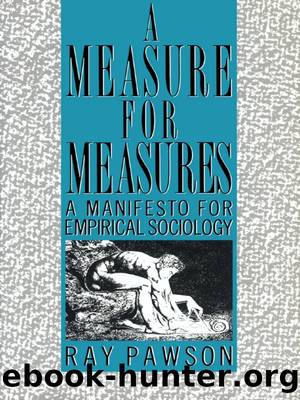A Measure for Measures by R Pawson

Author:R Pawson [Pawson, R]
Language: eng
Format: epub
Tags: Social Science, Sociology, General
ISBN: 9780415026598
Google: eZQOAAAAQAAJ
Publisher: Routledge
Published: 1989-01-15T04:39:50+00:00
6.2 THE EXPLICIT USE OF MECHANISMS
Let us turn, then, to those research strategies which utilize generative mechanisms on the basis of forethought rather than hindsight. This book is by no means the first to make the suggestion that social research should begin with the search for mechanisms underlying social regularities. Realism is enjoying something of a vogue in sociology; it has been quite broadly canvassed as the philosophical vindication of a research strategy that will avoid the slide into empiricism or relativism (Keat and Urry, 1975; Harré, 1978; Bhaskar, 1979; Sayer, 1984; Outhwaite, 1988). Diverse as some of the methodological ideas of its authors are, all would undoubtedly follow the first principle of realismâ that science is the business of understanding the unobservable structures and mechanisms that stand behind and produce concrete features of social reality. As you might expect, however, this rallying cry has not quite meant the same thing to all persons, and so it is important to identify those examples of generative thinking which seem to me to be the most productive.
The crudest interpretation of the injunction to seek for generative mechanisms is for analysts to proclaim the importance of their own work in terms of their ability to grasp the essence of a phenomenon whilst others are labouring away inappropriately at the level of outward appearance. Personally I feel there is much more to realist analysis than this appearance/reality distinction. Nonetheless one cannot get away from the feeling that even in the hands of its most sophisticated exponents realism represents little more than the justification for asserting that certain analytical priorities should apply in social analysis.
For instance Harréâs interpretation of realism allows him to assert that the vital generative causal mechanism is the human individualâs self-direction. The empirical analysis which is recommended on this basis thus concentrates on the everyday reasoning which underpins action. For instance, Marsh et alâs (1978) research on football âaggroâ, which is in this tradition, is concerned with âteasing outâ the rules which direct aggression on the terraces and, underlying this, the further set of rules which exist to govern how such actions should be spoken of. The only significant change from the traditional âhermeneuticâ orientations of this ânewâ perspective lies in the metatheory telling us why reasons and motivations should be the focus of concern, namely that they are now labelled âunobservablesâ because of their explanatory function as âgenerative mechanismsâ. In short, for ârealismâ here, read âethnography/ ethnomethodologyâ.
The same sleight of hand is applied, albeit on a completely different plane, in Keat and Urryâs version of realism. In this case they claim, on behalf of Marx, that his method was basically realist. Thus,
The term âclassâ is used by Marx in a realist manner. It refers to social entities which are not directly observable, yet which are historically present, and the members of which are potentially aware of their common interests and consciousness. The existence of class is not to be identified with the existence of inequalities of income, wealth, status or educational opportunity.
Download
This site does not store any files on its server. We only index and link to content provided by other sites. Please contact the content providers to delete copyright contents if any and email us, we'll remove relevant links or contents immediately.
Chaco's Northern Prodigies : Salmon, Aztec, and the Ascendancy of the Middle San Juan Region after AD 1100 by Paul F. Reed(367)
Digital International Relations by Unknown(366)
Law Enforcement Interpersonal Communication and Conflict Management by Brian Douglas Fitch(358)
The Enduring Color Line in U.S. Athletics by Krystal Beamon Chris M. Messer(340)
Skilled interpersonal communication: Research, theory and practice, Fifth edition by Owen Hargie(339)
Critical Perspectives on Human Security : Rethinking Emancipation and Power in International Relations by David Chandler; Nik Hynek(336)
EPSO CAST Political affairs EU policies: How to succeed in the selection procedure by Franco Reverte José María(313)
Evidence-Based Policy Making in Labor Economics by Hamermesh Daniel S.;Nottmeyer Olga K.;Nottmeyer Olga;King Sarah;King Sarah;King Sarah;(309)
Writing Public Policy - A Practical Guide to Communicating in the Policy Making Process by Catherine F. Smith(288)
Criminological Theory in Context by John Martyn Chamberlain(286)
Rothschild and Early Jewish Colonization in Palestine (Geographical Perspectives on the Human Past) by Ran Aaronsohn(280)
Tibeton Yoga Its Secret Doc by Evans-Wentz(279)
Threshold Concepts in Women's and Gender Studies by Christie Launius Holly Hassel(273)
Social Problems, Social Issues, Social Science by James Wright(271)
Positive Psychology and Spirituality in Counselling and Psychotherapy (Conflict, Ethics, and Spirituality, 12) by unknow(269)
Cognitive Development in Infancy and Childhood (Elements in Child Development) by Mary Gauvain(262)
Play in child development and psychotherapy: toward empirically supported practice by Sandra W. Russ(261)
Latin American Politics and Society by Gerardo L. Munck & Juan Pablo Luna(238)
What Makes a Social Crisis?: The Societalization of Social Problems by Jeffrey C. Alexander(227)
